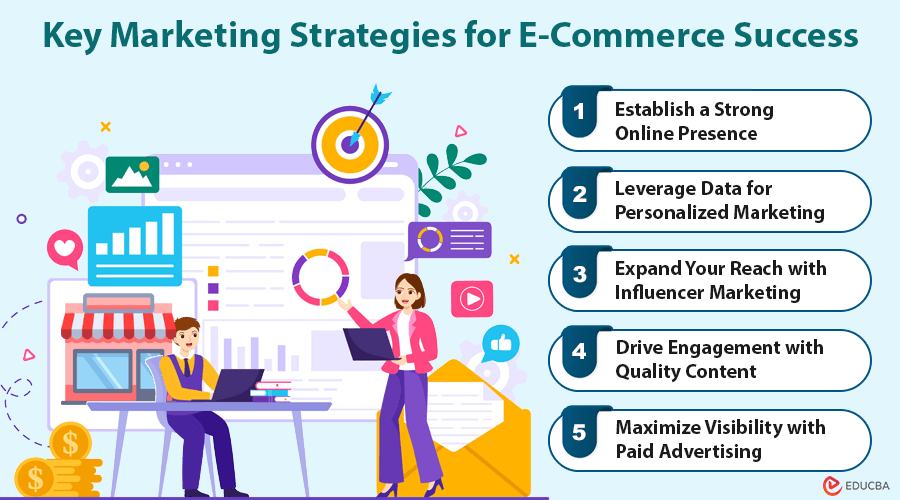
Driving Growth Through Smart Marketing Strategies
E-commerce has emerged as one of the fastest-growing industries worldwide, revolutionizing the way businesses engage with consumers. However, the success of any online business depends heavily on effective marketing strategies for e-commerce. From creating a unique brand identity to using data analytics, marketing is essential for attracting, engaging, and converting customers. This article will explore the key marketing strategies that can help e-commerce businesses thrive in a competitive market.
Why Marketing is Crucial for E-Commerce Growth
Marketing is the backbone of e-commerce, connecting businesses with their potential customers. While the digital landscape provides countless opportunities, it presents challenges, like standing out in a competitive marketplace. Effective marketing ensures that your brand does not just exist but thrives. With well-executed campaigns, businesses can generate traffic, foster customer loyalty, and boost sales while building long-term relationships with their audience.
Key Marketing Strategies for E-Commerce Success
Effective marketing is the backbone of e-commerce, helping businesses connect with potential customers in a crowded digital space. Here is a breakdown of the most important marketing strategies for e-commerce:
#1. Establish a Strong Online Presence
The foundation of any successful e-commerce business starts with a solid online presence. Since your website serves as your online store, it’s critical that it conveys your brand identity and provides a flawless online shopping experience. Partnering with a reliable provider of E-Commerce app development services can ensure your platform is optimized for performance, scalability, and user experience. Here is how:
- Search Engine Optimization: SEO enhances your website’s visibility in search results, making it more visible and accessible to customers. You can attract organic traffic by incorporating relevant keywords and producing valuable content.
- Social Media Platforms: Platforms like Instagram, TikTok, and Facebook allow businesses to connect with their audience through engaging content, stories, and posts. These channels help showcase your products and brand values, increasing visibility and engagement.
#2. Leverage Data for Personalized Marketing
Data-driven marketing is revolutionizing e-commerce by allowing businesses to understand their customers better. Customer relationship management software and Google Analytics are two examples of tools that assist in tracking user preferences, behavior, and purchasing trends. With this useful information, you can create customized marketing strategies like:
- Tailored Recommendations: Sending follow-up emails based on a customer’s browsing history can boost conversion rates.
- Targeted Ads: Use data to run ads that speak directly to individual customer needs and interests.
#3. Expand Your Reach with Influencer Marketing
Influencer marketing has revolutionized e-commerce. You may significantly increase your reach and visibility by working with influencers that align with your brand. Here is why it works:
- Micro-Influencers: These influencers typically have smaller but highly engaged audiences. Their authentic endorsements can help build trust with potential customers.
- Credibility and Trust: Collaborating with influencers who share your brand values establishes credibility and fosters stronger connections with your target audience.
#4. Drive Engagement with Quality Content
Content marketing continues to be one of the most effective ways to engage customers. Businesses can educate and entertain their audience through blogs, videos, and infographics while promoting products. Some key benefits include:
- Product Education: For example, a blog post on techwear can introduce customers to new trends, increasing their likelihood of purchasing.
- Brand Building: E-commerce businesses like Cyber Techwear use content marketing to share insights and foster a loyal following.
#5. Maximize Visibility with Paid Advertising
While SEO and content marketing are essential for long-term success, paid advertising can provide quick visibility. Paid ads are particularly effective for:
- Retargeting Campaigns: These campaigns target users who have visited your site but have not purchased, reminding them about the products they viewed.
- Effective Platforms: With platforms like Facebook Ads, Instagram Ads, and Google Ads, you can target certain demographics to ensure the correct people see your ads.
#6. Enhance Customer Experience for Retention
Customer experience is essential for retention in e-commerce. A smooth shopping journey encourages customers to return. Key elements include:
- Fast-Loading Pages: Ensure your site loads quickly to reduce bounce rates.
- Mobile-Friendly Design: Make sure your website is mobile-responsive to provide a smooth and enjoyable shopping experience on all devices.
- Excellent Customer Service: Offering live chat and prompt responses via social media ensures customers feel valued.
#7. Build Trust with Social Proof and Reviews
Social proof plays a crucial role in e-commerce. Positive reviews and testimonials can strongly influence customers’ purchasing decisions. To leverage this strategy:
- Encourage Reviews: Ask satisfied customers to leave and display reviews on your site to build trust.
- Use Testimonials: Sharing real-life customer experiences can help potential buyers gain confidence in their purchasing decisions. Additionally, an effective customer testimonial collection software can streamline the process of gathering feedback and showcasing authentic customer experiences, providing social proof that can convert hesitant visitors into loyal buyers.
The Future of Marketing in E-Commerce
As technology evolves, the future of e-commerce marketing will continue to shift. Artificial intelligence (AI) and machine learning (ML) will be more prominent in personalizing customer interactions and predicting trends.
Virtual reality (VR) and augmented reality (AR) will revolutionize online shopping by enabling customers to see and interact with products in real-time before purchasing.
Final Thoughts
Implementing effective marketing strategies for e-commerce is essential for any online business aiming for success. These strategies include establishing a robust online presence, utilizing data insights, and forming influencer partnerships to drive traffic, increase sales, and foster long-term customer relationships. As e-commerce continues to evolve, businesses that stay innovative in their marketing efforts will thrive. Focusing on these strategies ensures your e-commerce brand survives and thrives in a modern, competitive marketplace.
Recommended Articles
We hope this guide on marketing strategies for e-commerce helps you build impactful campaigns that drive traffic, increase conversions, and boost online sales. Check out these recommended articles for more expert tips and insights on growing your e-commerce business.
